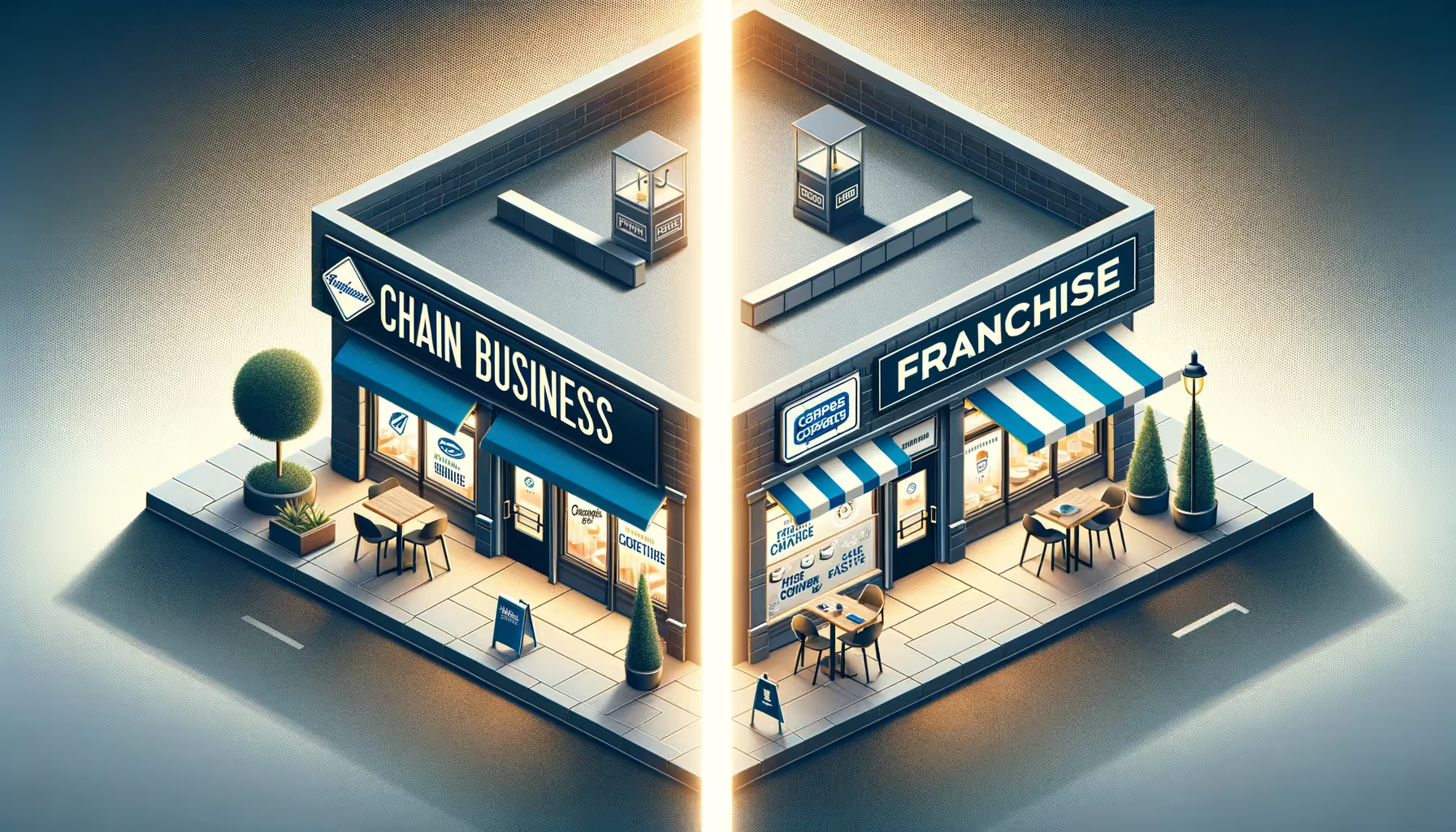Franchise Opportunities By Industry
Franchise Opportunities By Location
Franchise 101
By Investment Level
Franchise Consultant
White Paper
Playbook


In the dynamic landscape of modern business, understanding the nuances between chain and franchise operations is crucial for entrepreneurs and investors alike. This exploration offers an in-depth analysis of what defines a chain and a franchise, highlighting the key similarities and differences that shape these business models. From ownership structure to financing options, profit potential to inherent risks, and the consistency of operations, this article delves into each aspect comprehensively. We will also uncover the unique benefits that chains and franchises offer, such as volume pricing and streamlined advertising for chains, and strong brand identity and an established business model for franchises. Whether you're contemplating franchising your business or looking to open a franchise, this guide serves as an essential resource to inform your decision-making process and navigate the complex yet rewarding world of chains and franchises.
A chain refers to a series of businesses owned and operated by a single company. These businesses offer consistent products or services across various locations. Each unit in a chain is managed by the parent company, ensuring uniformity in quality, service, and branding. Chains are known for their standardized operational procedures, which allow them to maintain control over each aspect of their business, from product sourcing to customer service.
A franchise is a business model where independent entrepreneurs use the rights to a larger company's business name, logo, and products to operate an individual branch. In this model, the franchisor provides a licensed privilege to the franchisee to do business and offers assistance in organizing, training, merchandising, marketing, and managing in return for monetary consideration. Franchises are beneficial for those who wish to start a business with an established brand and proven business strategy.
Understanding the distinctions between chains and franchises is key to comprehending their roles in the global business landscape. While they share a common thread in multi-location operations, their operational and ownership models present unique characteristics and challenges. This section delves into these aspects, shedding light on how these models compare and contrast in practical settings.
Both chains and franchises involve multiple outlets operating under the same brand. They often share common branding strategies, quality standards, and operational procedures. These similarities enable them to build a recognizable brand image, ensuring customer familiarity and trust, regardless of the location.
In a chain, all outlets are owned by a single company, giving it complete control over operations. In contrast, franchise outlets are owned by individual franchisees who operate their branches under the franchisor's brand and guidance.
Chains are typically financed by the parent company or through business loans. In contrast, franchises are funded by franchisees, who pay initial franchise fees and ongoing royalties to the franchisor.
Profits in a chain are directed back to the parent company. In a franchise, profits are split; the franchisee keeps a portion, and a percentage goes to the franchisor as royalty fees.
Chains bear the full risk of their operations, whereas in franchises, the risk is distributed between the franchisor and franchisees. Franchisors risk their brand reputation, while franchisees risk their capital investment.
Chains typically have higher consistency across locations due to centralized control. Franchises strive for consistency, but there can be variations due to different management by individual franchisees.
Owning and operating a chain business comes with a variety of advantages, many of which stem from the centralized control and uniformity of the business model. Some key benefits include volume pricing, streamlined advertising, and the ability to experiment effectively.

One of the primary benefits of running a chain is the advantage of volume pricing. Due to the larger scale of operations and bulk purchasing for multiple locations, chains can negotiate lower prices for goods and services. This bulk buying power not only reduces costs but also leads to better profit margins. The savings achieved through volume pricing can be substantial, allowing chains to offer competitive pricing to customers or to increase their overall profitability.
Chains benefit from streamlined advertising efforts. With a unified brand image and messaging across all locations, advertising campaigns can be more coherent and impactful. This unified approach to marketing ensures brand consistency, which is crucial in building brand recognition and loyalty. Additionally, the cost of advertising is spread across all locations, making it more cost-effective. A single, powerful marketing strategy can be deployed across all outlets, increasing the reach and frequency of brand messages without the need for location-specific adaptations.
The chain model also allows for controlled experimentation. New products, services, or operational strategies can be tested in select locations before a company-wide rollout. This approach enables chains to innovate and adapt to market trends with a lower risk. Successful trials can be quickly scaled up and implemented across all outlets, while unsuccessful ones can be revised or abandoned with minimal impact. This ability to experiment and rapidly adapt plays a crucial role in the chain's growth and sustainability in an ever-changing market environment.
Franchising offers a unique set of advantages that can be particularly appealing to entrepreneurs. Key among these are the benefits of leveraging a strong brand identity and operating under an established business model.

One of the most significant benefits of a franchise is the ability to utilize a well-established brand identity. Franchises allow entrepreneurs to operate under a name that often already has customer recognition and loyalty. This immediate brand recognition can be a huge advantage in attracting customers from the outset, as it eliminates the need and the associated challenges of building a brand from scratch. A strong brand identity comes with built-in marketing benefits, trust, and a reputation that would typically take years to establish independently.
Another major advantage of franchising is the access to an established business model. This model has been tested and proven over time, significantly reducing the risks usually associated with starting a new business. Franchisees benefit from a roadmap for running their businesses, which includes detailed information on operations, marketing, financial management, and staffing. This guidance can be invaluable, especially for entrepreneurs new to business ownership. Furthermore, franchisors often provide ongoing support and training, ensuring that franchisees are well-equipped to succeed.
When you decide to open a franchise, it’s important to conduct thorough research and consider several key factors:
Brand Reputation and History: Research the brand's market presence, history of success, and its reputation among consumers and other franchisees.
Initial and Ongoing Costs: Understand the initial franchise fee, ongoing royalties, and any other recurring expenses. Ensure that these costs are sustainable for your financial situation.
Franchisor Support: Evaluate the level of training and support provided by the franchisor. This includes marketing, operational support, training, and other resources.
Territorial Rights: Clarify your territorial rights to ensure you're not competing with other franchisees of the same brand.
Legal Considerations: Review the Franchise Disclosure Document (FDD) carefully. Consider consulting with a franchise lawyer to understand the terms and conditions.
Market Viability: Analyze the demand for the franchise’s products or services in your chosen location and the local competition.
Exit Strategy: Understand the terms of your franchise agreement in case you decide to sell or terminate the franchise.
In the quest to expand or start a business, choosing between a chain and a franchise model is a decision that carries significant implications. Both models offer distinct advantages and challenges that cater to different business needs and personal preferences. While chains provide greater control and consistency, franchises offer the security of an established brand and support system.
The decision to opt for a chain or franchise should be based on careful consideration of one’s business goals, financial capacity, risk tolerance, and the desire for operational control. Prospective business owners must weigh the autonomy and creative freedom of running a chain against the structured support and brand recognition of a franchise.
In conclusion, whether you choose to develop a chain or buy into a franchise, success hinges on thorough market research, a clear understanding of the business model, and a solid strategy. The journey of business ownership, whether as a chain operator or franchisee, is one of constant learning, adaptation, and commitment. Your path should align not just with your business objectives but also with your personal strengths and lifestyle aspirations.